U.S. Secretary of State Antony Blinken said Friday that the proposed transitional council in Haiti, meant to provide a political transition and bring stability to the troubled Caribbean nation, was still not set, but he expressed confidence it would be in the coming days.
Speaking at a news conference in Austria, Blinken said most Haitian social and political stakeholders had named their representatives to the seven-member council but that “a couple” had not. He expressed confidence they soon would.
Blinken took part early this week in an emergency meeting on Haiti in Jamaica, led by the regional trade group CARICOM. It was during that meeting that the Transitional Presidential Council, consisting of seven voting members and two nonvoting observers, was agreed to.
Under the agreement, Blinken said, the council would appoint an interim prime minister and, together with the interim leader, appoint an inclusive council of ministers, including a national security council and a commission that would oversee new elections.
“This was a Haitian-led agreement,” Blinken said. He said that the issue of security was related but separate, and that distributing humanitarian aid, developing the economy and setting up elections would be impossible if there was profound insecurity in Haiti.
Violence in Haiti’s capital, Port-au-Prince, has left much of the city under the control of heavily armed gangs. Agence France-Presse reported that attacks continued overnight Friday into Saturday, taking place at Port-au-Prince airport and a top police official's home. It said residents set up roadblocks in two areas of the city to try to impede criminal gangs.
Blinken said the international community has been working for months on the multinational security force, led by Kenya and other African and Caribbean nations in support of the Haitian police. He said it was moving forward but would not be in place until the transitional council was set up.
The secretary of state said he expected that to happen in the coming days, but in Haiti, “Every single day, there are challenges to that process — political challenges, security challenges — and we are working to address them.”
U.N. Secretary-General Antonio Guterres' spokesperson called Friday for "all Haitian stakeholders to set aside their differences and take immediate action to advance the implementation of the transitional governance arrangements."
Also Friday, U.S. aid chief Samantha Power announced $25 million in humanitarian assistance for Haiti, on top of $33 million announced by the U.S. government on Monday.
Under pressure from the United States and other regional nations, unpopular and unelected Prime Minister Ariel Henry announced Monday that he would step down once the transitional council was in place. The White House confirmed Thursday that Henry was in Puerto Rico.
On Thursday, gang alliance leader Jimmy “Barbecue” Cherizier threatened the politicians who are to take part in the transitional council.
Also Thursday, the United Nations said it was working to establish an aid airlift to Haiti.
And in Washington, the U.S. Senate voted Thursday to confirm career diplomat Dennis Hankins as ambassador to Haiti. The confirmation marked the first time the diplomatic post will be filled in the country in almost 2-1/2 years.
The U.S. said its embassy remained open and limited operations continued, focused on assisting Americans in Haiti and “supporting Haitian-led efforts to secure a peaceful transition of power.”
Other embassies, including Canada’s, have similarly reduced embassy staff in the country over safety concerns.
VOA’s Patsy Widakuswara contributed to this report. Some information came from Reuters and Agence France-Presse.






